Orthotics Pittsburgh and Arch Supports

ORTHOTICS
- Prescribed orthotics and insoles are often covered by your insurance when distributed by a podiatrist!
- Arch supports help prevent plantar fasciitis and treat heel spur pain
- We now offer CROCS , Spenco Sandals, & OTC Arch Supports that you can try on!

Need Orthotics Pittsburgh?
When considering an arch support or orthotic insole device, go to a podiatrist to be evaluated. Visit a Foot Clinic not a salesman at the Good Feet Store. Have a thorough bio-mechanical exam. Evaluate specific joint motion and gait pattern as it pertains to the lower extremities. ie. heel pain, your foot type, muscle strength, arch pain, heel spurs found, age, shoe gear and activity level will also help properly prescribe your arch supports or foot orthotics Pittsburgh!
Benefits of Custom Orthotics
- Tailored to your activity and foot type
- Prevents further damage to your foot from abnormal motion
- Custom made – to provide maximum comfort
- Helps alleviate heel spurs and arch pain
- Covered by many insurances

Arch Supports for women, Children, running
Arch supports and Orthotics come in Rigid, Semi-Rigid, Soft/Flexible and dress shoe. Ask your doctor about the right style for you.
Orthotics and Arch Supports
What is an arch support? An arch support is foot pad or heel insert purchased OTC or by shoe size from your local podiatrist.
What is an orthotic device? An orthotic device is a custom-molded, individually designed shoe insert or ankle brace.
What are Orthotics used to treat?
- Plantar fasciitis- a common painful inflammation of the sole of the foot. It often causes pain

Insoles for Diabetic Shoes Pittsburgh Pa
first thing in the morning.
- Metatarsalgia- or stress fractures a painful foot disorder that affects the bones and joints at the ball of the foot or top of the forefoot.
- Arthritis- Like a stiff big toe joint and affects joints of the foot
- Diabetes- usually get softer accommodative supports. This relieve pressure and friction to a diabetics delicate skin. This may often requires custom shoe modifications or custom-built footwear.
- Achilles tendonitis– painful foot disorder at the back of the heel where then tendon attaches.
Arch Support Sandals

Orthotics to treat back pain
Back pain is very hard to treat and often has many causes. It is influenced by many factors that we can’t control like genetics, previous injury, or work requirements. For these reasons, orthotics or heels lifts may or may not help alleviate at least some of the symptoms. They are often prescribed for back pain. A leg-length difference, which causes alterations all the way up the leg to the back is one example.
Preventing or treating the overuse injuries of the lower body:
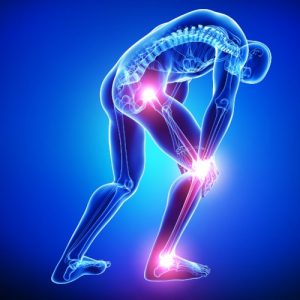
Overuse injuries from walking or standing jobs cause arch pain. Repetitive strain injuries from working out too much are another common cause. Heel spurs often afflict runners, walkers, and hikers.
Biomechanics are one factor. However, the main problem with most repetitive strain injuries is… repetitive strain . That is, your body parts would feel the overuse and strain even if your biomechanics were fine. Our orthotics are made using a plaster cast of the foot then sent to a lab where your own personal pair of custom orthotic inserts will be created. The devices are custom made for your feet. Just as contact lenses or glasses improve vision, orthotics will help your podiatrist improve the way your foot functions.
Biomechanics, Gait Analysis & Orthotics
At Beaver Valley Foot Clinic we focus on providing the latest technology and expertise for the treatment and prevention of injuries, including:
- Radiographic and biomechanical assessment of foot and ankle disorders
- Clinical assessment of quality and causes of lower limb pain
- Prescription of corrective foot orthoses for the realignment of joints in the foot and lower limb.
- Advice and modification of diabetic insoles to offload pressure, running shoes, soccer cleats, and other sports footwear. You’ll get optimal fit based on the style of shoe you wear and an inexpensive shoe insert that rivals expensive prescription custom orthotics often costing over $600 elsewhere.
Rigid orthotics versus Flexible orthotics:

Plantar Fascia Pain
For most active younger patients (30-60 years old) most podiatric doctors recommend semi rigid or semiflexible custom orthotics capable of absorbing shock and adapting to the ground. Rigid insoles don’t allow for the normal motion around the subtalar joint.
Orthotic Styles Available
We offer a full range of orthotics including:
- Rigid and carbon fiber
- Semi rigid
- Semiflexible
- Accommodative or soft orthotics
- full length and metatarsal length devices and topcovers
- Sports orthotics
- Mens leather lined suit orthotics
- ‘Dressthotics’ or Slimfit Fashion orthotics
- Light and thin carbon cycling orthotics
- Diabetic insoles
- Running orthotics – casual, marathon and racing
- Arch support sandals
- ‘Kidthotics’ or Children’s Orthotics
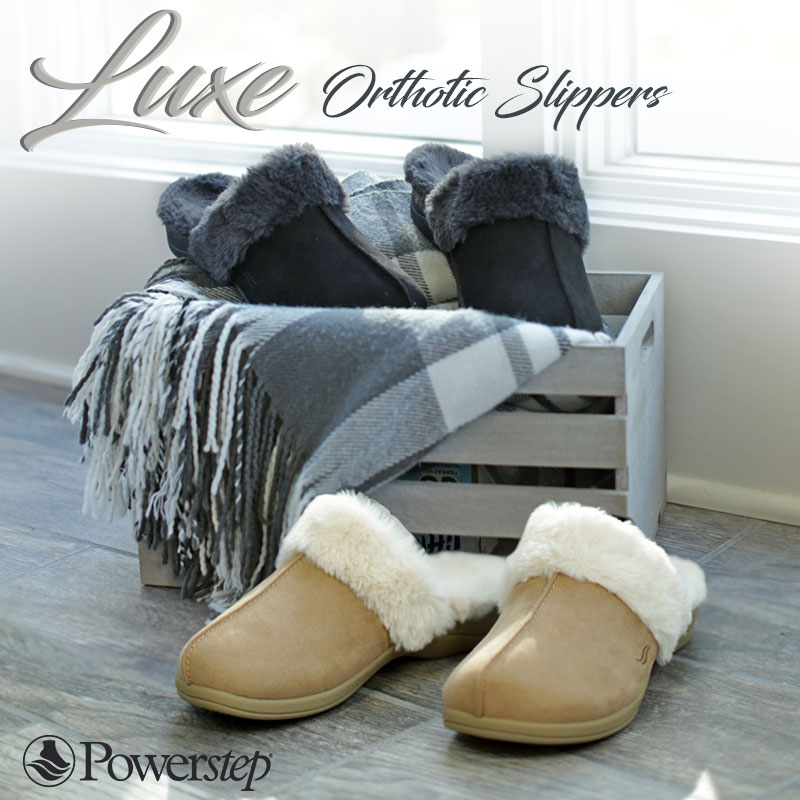
We carry custom made orthotics, OTC arch supports, orthotics shoes, arch supports for flat feet, inserts for plantar fasciitis, Orthotics for sandals, flip flops with arch support, slippers with arch support and many more! We are your orthotics doctor!
Caring for your Orthotics Pittsburgh
You may gently wash your orthotics with warm water and soap- heat can cause damage. Completely air dry before reinserting into shoes so mold and mildew don’t grow.
if you notice a bad foot odor or if your devices smell, you may have athletes foot or what is medically called ‘ tinea pedis’. If you have hyperhydrosis this is especially common. That means your feet perspire a lot. The moisture provides the perfect environment for the overgrowth of foot fungus. Let your podiatrist evaluate the cause and to see what can be done to treat it. Often treatment can be as simple as an antiperspirant cream after showering or an anti fungal cream before bed. That is why correct diagnosis is necessary.
FAQs:
What do arch supports do?
Orthotic devices in Moon Twp frequently treat various conditions of the foot and ankle.
How much do custom inserts cost? Costs range from $70 to more than $600. The $70 arch supports are barely a customized shell and while they are better than $20 OTC inserts, often do not control the motion as needed. The $5-600 spent at places like a good foot store make many podiatrists cry. They are off the shelf; often misfit by an improperly trained salesperson with no medical background and can do more harm than good. Anecdotally there will be successes, but this is very over priced. At our office we cast patients in plaster and make a mold of their foot and send this out to a special podiatric orthotic lab and never charge more than $300. So if you have a high deductible and want custom made by a Podiatrist, this would be your best deal.
Do insurance companies cover orthotics Pittsburgh area?
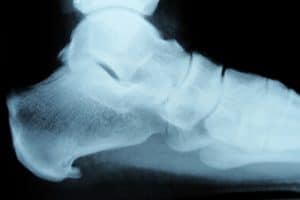
Many insurance companies do cover custom orthotics Pittsburgh. OTC or off the shelf “arch supports” are not covered. Insurance companies require the provider to first make a mold of the patient’s foot. Second, create a custom made device in the lab. This will control certain biomechanical or congenital or acquired foot deformities.
What can I do if I find my custom orthotics are too hard? Your foot clinic in Sewickley can add a soft top cover. Before you get your orthotics inserts, you can ask your podiatrist to order them with a soft layer on top.
Highmark Medical Policy Bulletin:
- Foot orthotics are covered only if a member’s contract benefit and when a Doctor prescribes them for these conditions:
Calcaneal spur (726.73) - Achilles tendonitis (726.71)
- Hallus rigidus (735.2, 755.66)
- Calcaneal apophysitis (732.5)
- Plantar fasciitis (728.71)
- Posterior tibial insufficiency (Posterior tibial tendon dysfunction)
- Chondromalacia of the patella secondary to pronation deformity of the foot
- Degenerative joint disease (715.17, 715.27, 715.37, 715.97)
- Sever’s Disease (732.5)
- Metatarsus adductus in children (754.52-754.53)
- Limb length discrepancy (736.81)
- Pes cavus deformity (754.71, 736.73)
- Clubfoot (736.71, 754.51, 754.70)
- Hammertoe digit syndrome (735.4, 755.66)
- Tibialis posterior tendonitis (726.72)
- Symptomatic intractable plantar keratosis
- Neuroma (355.6)
- Tibialis anterior tendonitis (726.72)
- Symptomatic hallux valgus (735.0, 755.66)
- Status post recurrent ankle sprain with high calcaneal varus
- Status post foot surgery for continued correction (e.g., surgically treated fractures)
- Rheumatoid arthritis (714.0-714.2, 714.30-714.33, 714.4, 714.81-714.89, 714.9)
Foot care products purchased over-the-counter without a prescription, e.g., premolded arch supports, (L3040-L3090), do not meet the definition of foot orthotics. Insurance does not cover them.
We carry both custom made and OTC arch supports.
Foot Soldier Shells
The average custom foot orthotic by shoe size, available in three rigidities.
Local Pittsburgh Orthotics and Arch Supports Pittsburgh Area
Orthotics and Arch Supports
If you have heel pain or plantar fasciitis, Instead of going to a “good foot store” it is better to get custom orthotics from a local Pittsburgh podiatrist who can actually evaluate the function of your foot and correctly fit your biomechanical needs for Orthotics and Arch Supports and not just have a salesperson measure your foot size.
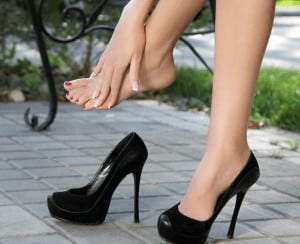 There is a time and place for OTC “arch supports”, but a podiatrist in Pittsburgh should make that determination with all your medical information in hand.
There is a time and place for OTC “arch supports”, but a podiatrist in Pittsburgh should make that determination with all your medical information in hand.
An example may be- an uncomplicated arch tiredness in the normal foot may be able to use an over the counter arch support, but if your arch is high or low then custom made or a different style of over the counter arch support is required. Sales people would not know the difference.
“Gellin” is also rarely indicated and functional support orthotics are required instead.
Arch supports and orthotics help prevent plantar fasciitis and treat heel spur pain. Our local Pittsburgh Foot Clinics now even offer ‘flip flops’ with arch supports built into them.
Benefits of Custom Orthotics
- Tailored to your activity and foot type
- Prevents further damage to your foot from abnormal motion
- Custom made – to provide maximum comfort
- Helps alleviate heel spurs and arch pain
- Covered by many insurances
Breaking in your Orthotics
When your first start wearing your orthotics for sport, you should be aware that you must also wear them in gradually at this time too. Wearing them in gradually allows your feet to adapt to a different functioning posture, and for you skin to toughen up in areas where they may previously not have been touching anything (and are now in contact with the orthotics).

PowerStep has been awarded the APMA Seal of Acceptance for manufacturing products that promote healthy feet. Powerstep, arch supports, Orthotics and many other inserts come in Rigid, Semi-Rigid, Soft/Flexible and dress shoe – Ask your doctor about the right style for you.

Available Exclusively Through Medical Professionals
We supply arch supports and orthotics to Pittsburgh and Butler, Allegheny & Beaver Counties.

ProTech Medical Insoles
- The Powerstep ProTech medical insoles are designed with built-in arch support, heel cradle, and a perfect balance of support and comfort. These orthotic insoles help alleviate discomfort caused by foot conditions like plantar fasciitis, Morton’s neuroma, heel spurs, arch pain, and more. These medical-grade arch support insoles are available exclusively through medical professionals. ProTech products purchased from unauthorized resellers are not covered under our Total Satisfaction Guarantee.
- plush foam cushioning with clinically-proven support
CLINICALLY PROVEN, PROFESSIONALLY RECOMMEND

POWERSTEP IS THE #1 PODIATRIST-RECOMMENDED BRAND OF ORTHOTIC INSOLES Many people feel relief from their foot pain within 4 weeks of using PowerStep insoles and continue to experience the same improvement as they would from wearing a more expensive custom-made orthotic.*

UNSUPPORTED FOOT tends to roll inward. The arch flattens, stretching the tissues while bones misalign.

FOOT WITH POWERSTEP provides foot posture and support to correct bone alignment and prevent pain.
Shoe Accessories
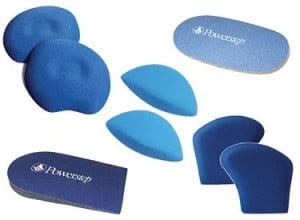
Powerstep metatarsal foot pads, ball of foot cushions, and other accessories can be used in conjunction with Powerstep orthotics for enhanced support and comfort during wear. We offer adjustable heel lifts that help with leg length discrepancy, met pads that provide additional cushioning under the ball of your foot, and flexible arch supports that give your arches an extra boost. Explore our foot support accessories today!
Caring for your Orthotics
You may gently wash your orthotics with warm water and soap- heat can cause damage. Completely air dry your orthotics before reinserting into shoes so mold and mildew dont grow.
If you notice a bad foot odor or if your devices smell, you may have athletes foot or what is medically called ‘ tinea pedis’. If you have hyperhydrosis this is especially common. That means your feet perspire a lot. The moisture provides the perfect environment for the overgrowth of foot fungus. Let your podiatrist evaluate the cause and to see what can be done to treat it. Often treatment can be as simple as an antiperspirant cream after showering or an anti fungal cream before bed. That is why correct diagnosis is necessary.
FAQs:
What are orthotics used for? Orthotic devices in Moon Twp are frequently used to treat various conditions of the foot and ankle.
How much do custom orthotic inserts cost?
Costs range from $100 to more than $600. The $70 arch supports are a customized shell and while they are better than $50 OTC inserts, often do not control the motion as needed. The $500-600 spent at places like a good foot store make many podiatrists cry. They are off the shelf; often misfit by an improperly trained salesperson with no medical background and can do more harm than good. Anecdotally there will be successes, but this is very over priced. At our office we cast patients in plaster and make a mold of their foot and send this out to a special podiatric orthotic lab and never charge more than $300. So if you have a high deductible and want custom orthotics made by a Podiatrist, this would be your best deal.
Do insurance companies cover Orthotics and Arch Supports?
Many insurance companies do cover custom orthotics in Pittsburgh, but not OTC or off the shelf “arch supports”. Insurance companies require the provider to make a mold of the patient’s foot and create a custom made device in the lab to control certain biomechanical or congenital or acquired foot deformities.
Which Shoes and Socks with Orthotics and Arch Supports?
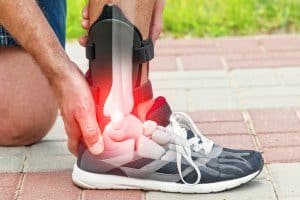
There’s an old saying that says your orthotics are only as good as the shoes you wear them. If you have any questions you need answered feel free to discuss the types of shoes you may want to wear your orthotics with to your podiatrist.
– Socks: If possible it is generally advised to wear socks or stocking with your orthotics (especially during the break in period). If you’re someone who likes to wear your orthotics in shoes without socks make sure you gently clean them regularly and let your podiatrist know which shoes you like to wear them in as there are many choices of top covers for your orthotics better suited to bare feet than others.
– Heel slipping when walking. Some shoe designs are too low cut at the heel to be suitable to wear orthotics with which is why you should bring your orthotics with you when you go shoe shopping. If there are shoes you already have that are slipping, its worth mentioning to your podiatrist as they may be able to thin your orthotics for fit or fit you with a pair of fashion orthotics which contain no bulk in the heel at all.
– Buying shoes for orthotics: It is important to try on new shoes with your orthotics prior to purchasing them, especially running shoes. Avoid designs that do not have a method of securing the shoe close to your foot such as a strap or a lace.



